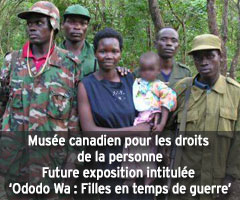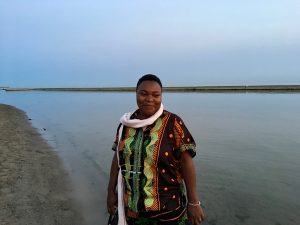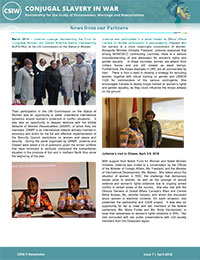Disponible seulement en anglais
By Chika Maduakolam
8 March 2021
‘What is important is that victims need to stay central to the issues of justice’– Solomy Awidi (1:18:23)
For many Ugandans, February 4, 2021, will be forever etched in their minds. The International Criminal Court (ICC, the court) delivered its long awaited verdict of Dominic Ongwen, a former Lord’s Resistance Army (LRA) commander, on charges of war crimes and crimes against humanity. This judgment is notable as a crucial step on the path to achieving justice and accountability for the atrocities committed by the LRA. Ongwen was convicted by the ICC of 61 counts of war crimes and crimes against humanity, consisting of crimes of sexual and gender-based violence, including the first indictment for forced marriage, and conscripting and using child soldiers in hostilities.
Following the judgment, the Refugee Law Project (RLP) in conjunction with its partners, Conjugal Slavery in War (CSiW) project and others, held an intervention, on the 23rd of February, 2021, to discuss the Ugandan Perspectives on the ICC decision in the Dominic Ongwen case. The intervention adopted a conversation style format amongst the RLP, its partners, activists, interested commentators and attendees, and victim-survivors, which included Grace Acan, Vincent Oyet, and Alex Odong. The conversation elicited a wide range of interesting issues and questions from participants and I would like to reflect on the following two aspects of the conversations:
Expectations of Victim-Survivors
Priscilla Aling, who works with the ICC legal representative of the victim-survivors, started off the conversation on the need to manage the expectations of the victims. Drawing from her experience working with victim-survivors during the trial, she described the value of victim participation in the ICC trial, she emphasized that one of the pillars to building legal participation lay in identifying the needs of victim-survivors beyond prosecutorial justice. Justice in court she alluded provides an opportunity to capture issues that previously were overlooked in the narrative, such as recognizing male victims of sexual and gender-based violence and ensuring that a human face is presented at the trial by incorporating the testimony of victim-survivors in the prosecution of Ongwen. Read full article here (pdf)






